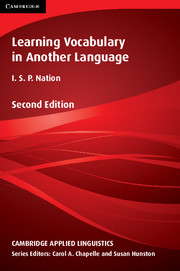Book contents
- Frontmatter
- Contents
- Series editors' preface
- Acknowledgements
- Introduction
- 1 The goals of vocabulary learning
- 2 Knowing a word
- 3 Teaching and explaining vocabulary
- 4 Vocabulary and listening and speaking
- 5 Vocabulary and reading and writing
- 6 Specialised uses of vocabulary
- 7 Vocabulary-learning strategies
- 8 Learning words from context
- 9 Word parts
- 10 Using dictionaries
- 11 Deliberate learning from word cards
- 12 Finding and learning multiword units
- 13 Testing vocabulary knowledge and use
- 14 Designing the vocabulary component of a language course
- Appendices
- 1 Headwords of the Academic Word List
- 2 Vocabulary levels dictation test
- 3 Function words
- Subject index
- Author index
2 - Vocabulary levels dictation test
from Appendices
Published online by Cambridge University Press: 15 February 2018
- Frontmatter
- Contents
- Series editors' preface
- Acknowledgements
- Introduction
- 1 The goals of vocabulary learning
- 2 Knowing a word
- 3 Teaching and explaining vocabulary
- 4 Vocabulary and listening and speaking
- 5 Vocabulary and reading and writing
- 6 Specialised uses of vocabulary
- 7 Vocabulary-learning strategies
- 8 Learning words from context
- 9 Word parts
- 10 Using dictionaries
- 11 Deliberate learning from word cards
- 12 Finding and learning multiword units
- 13 Testing vocabulary knowledge and use
- 14 Designing the vocabulary component of a language course
- Appendices
- 1 Headwords of the Academic Word List
- 2 Vocabulary levels dictation test
- 3 Function words
- Subject index
- Author index
Summary
An account of the making and validation of equivalent forms of this test along with how to use and mark the test can be found in Fountain and Nation (2000).
INTRODUCTION
The demand for food/becomes more important/as the number of people in the world/continues to increase./
PARAGRAPH 1:
The duty to care/for the members of a society/lies with those who control it,/but sometimes governments/refuse to deal with this problem/in a wise way,/and fail to provide enough to eat./When this occurs many ordinary people suffer./
PARAGRAPH 2:
Often their economic situation/does not permit them to create/a system of regular supply./When food is scarce,/the pattern of distribution/is generally not uniform./In some areas production/is sufficient to satisfy the needs of the population./In others pockets of poverty exist./
PARAGRAPH 3:
Using as their basis the research of experts/to discover the factors/in the previous failures to prevent starving,/those in positions of leadership/should institute reforms./Unless ancient traditions of administration are overthrown/the existence of the coming generations of mankind/will be threatened./
PARAGRAPH 4:
Though it is reasonable to presume that a reduction of consumption/could be recommended in regions of prosperity,/if this was enforced it would meet opposition/with thousands rebelling/in their determination to maintain their independence/from those politicians dictating to them.
- Type
- Chapter
- Information
- Learning Vocabulary in Another Language , pp. 603Publisher: Cambridge University PressPrint publication year: 2013

